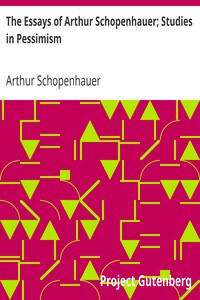The Essays of Arthur Schopenhauer; Studies in Pessimism by Arthur Schopenhauer
"The Essays of Arthur Schopenhauer: Studies in Pessimism" by Arthur Schopenhauer is a philosophical text written in the early 19th century. The collection comprises various essays reflecting on the nature of existence, with a notably pessimistic viewpoint on human life and suffering. It covers themes like the inherent suffering of life, the vanity of existence, suicide, and philosophical reflections on education and women, all of which explore the darker aspects of the
human condition and the quest for meaning within it. The opening of the work sets a bleak tone as Schopenhauer delves into the concept of suffering, suggesting that life's primary objective is intertwined with pain and misfortune. He critiques optimistic philosophies that dismiss the prevalence of evil and suffering, emphasizing that happiness is merely the absence of pain. Schopenhauer illustrates human existence as a series of disappointments, marked by an underlying madness due to unfulfilled desires. Through vivid analogies about life's futility and the inevitability of death, he positions existence as fundamentally flawed. He further argues that if humans could foresee the hardships of life, many would choose not to be born at all, thus framing existence as a burden rather than a gift. This opening establishes a strong foundation for the exploration of Schopenhauer's philosophical pessimism. (This is an automatically generated summary.)
Read or download for free
| How to read | Url | Size | |||
|---|---|---|---|---|---|
| Read now! | https://www.gutenberg.org/ebooks/10732.html.images | 225 kB | |||
| EPUB3 (E-readers incl. Send-to-Kindle) | https://www.gutenberg.org/ebooks/10732.epub3.images | 170 kB | |||
| EPUB (older E-readers) | https://www.gutenberg.org/ebooks/10732.epub.images | 172 kB | |||
| EPUB (no images, older E-readers) | https://www.gutenberg.org/ebooks/10732.epub.noimages | 140 kB | |||
| Kindle | https://www.gutenberg.org/ebooks/10732.kf8.images | 406 kB | |||
| older Kindles | https://www.gutenberg.org/ebooks/10732.kindle.images | 388 kB | |||
| Plain Text UTF-8 | https://www.gutenberg.org/ebooks/10732.txt.utf-8 | 191 kB | |||
| Download HTML (zip) | https://www.gutenberg.org/cache/epub/10732/pg10732-h.zip | 169 kB | |||
| There may be more files related to this item. | |||||
Similar Books
About this eBook
| Author | Schopenhauer, Arthur, 1788-1860 |
|---|---|
| Translator | Saunders, T. Bailey (Thomas Bailey), 1860-1928 |
| Title | The Essays of Arthur Schopenhauer; Studies in Pessimism |
| Credits | E-text prepared by Juliet Sutherland, Josephine Paolucci, and the Project Gutenberg Online Distributed Proofreading Team |
| Reading Level | Reading ease score: 59.0 (10th to 12th grade). Somewhat difficult to read. |
| Language | English |
| LoC Class | B: Philosophy, Psychology, Religion |
| Subject | Pessimism |
| Category | Text |
| EBook-No. | 10732 |
| Release Date | Jan 1, 2004 |
| Most Recently Updated | Oct 28, 2024 |
| Copyright Status | Public domain in the USA. |
| Downloads | 4259 downloads in the last 30 days. |
| Project Gutenberg eBooks are always free! | |

